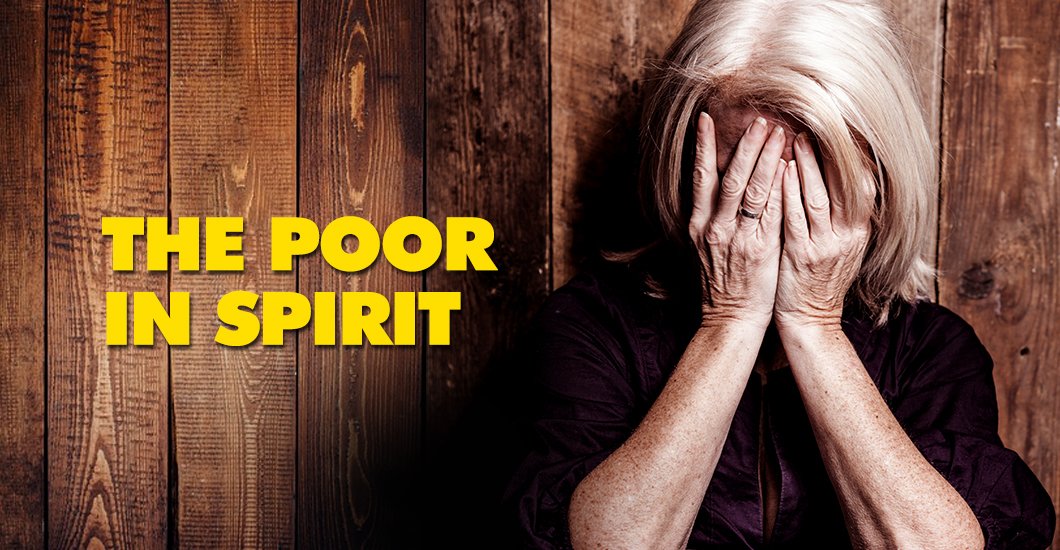
In the beatitudes of the Sermon on the Mount (what I call the Jesus Manifesto), Jesus declares,
Fortunate [blessed] are the poor in spirit, for theirs is the kingdom of heaven
(Matthew 5:3)
What exactly does it mean to be poor in spirit, and why does being poor in spirit result in the kingdom of heaven? Why is “poor in spirit” something God wants us to be? Why would God want us to be “poor” at anything?
Some propose that Jesus is speaking of financial poverty, that He is advocating being poor so that riches and possession don’t come between us and God. While it is true that Jesus elsewhere warned against seeking riches (Matthew 6:24), that does not seem to be Jesus’ point in Matthew 5:3. Jesus is speaking of being “poor in spirit”; i.e., being “spiritually poor.” In the beatitudes, Jesus is concerned with spiritual realities, not material possessions. What, then, does it mean to be spiritually poor at work?
To be poor in spirit at work is to recognize your utter spiritual bankruptcy before God. It is understanding that you have absolutely nothing of worth to offer God. Being poor in spirit is admitting that, because of your sin, you are completely destitute spiritually and can do nothing to deliver yourself from your dire situation. Jesus is saying that, no matter your status in life, you must recognize your spiritual poverty before you can come to God in faith to receive the salvation He offers.
The best later example of the same truth is the nominal church of Laodicea to whom John was directed to send a letter from the glorified Messiah. He quoted their complacent words and added his own assessment of them: ‘You say, I am rich, I have prospered, and I need nothing; not knowing that you are wretched, pitiable, poor, blind, and naked.’ This visible church, for all its Christian profession, was not truly Christian at all. Self-satisfied and superficial, it was composed (according to Jesus) of blind and naked beggars. But the tragedy was they would not admit it. They were rich, not poor, in spirit.
Still today, as leaders, the indispensable condition of receiving the kingdom of God is to acknowledge our spiritual poverty. God still sends the rich away empty. As C. H. Spurgeon expressed it,
‘The way to rise in the kingdom is to sink in ourselves.’
Why and how does being poor in spirit result in the kingdom of heaven? God offers us salvation as a gift, through the sacrifice of Jesus the Messiah on the cross, the full payment for sin’s penalty. Before we can receive this gift, we must understand that we cannot make ourselves worthy of it. Salvation is by grace through faith, not of works (Ephesians 2:8-9). We must recognize our sinfulness before we can understand our need for a Savior. We must admit our spiritual poverty before we can receive the spiritual riches God offers (Ephesians 1:3). We must, in short, be “poor in spirit.”
When Jesus says, “Blessed are the poor in spirit, for theirs is the kingdom of heaven,” He is declaring that, before we can enter God’s kingdom, we must recognize the utter worthlessness of our own spiritual currency and the inability of our own works to save us.
What is the Old Testament view of poverty of spirit? The Old Testament supplies the necessary background against which to interpret this beatitude. At first to be ‘poor’ meant to be in literal, material need. But gradually, because the needy had no refuge but God, ‘poverty’ came to have spiritual overtones and to be identified with humble dependence on God. Thus the psalmist designated himself ‘this poor man’ who cried out to God in his need, ‘and the Lord heard him, and saved him out of all his troubles’. The ‘poor man’ in the Old Testament is one who is both afflicted and unable to save himself, and who therefore looks to God for salvation, while recognizing that he has no claim upon him.
This kind of spiritual poverty is specially commended in Isaiah. It is the poor and needy’, who ‘seek water and there is none, and their tongue is parched with thirst’, for whom God promises to ‘open rivers on the bare heights, and fountains in the midst of the valleys’, and to ‘make the wilderness a pool of water, and the dry land springs of water’. The ‘poor’ are also described as people with ‘a contrite and humble spirit’; to them God looks and with them (though he is ‘the high and lofty One who inhabits eternity, whose name is Holy’) he is pleased to dwell.
It is to such that the Lord’s anointed would proclaim good tidings of salvation, a prophecy which Jesus consciously fulfilled in the Nazareth synagogue: ‘The Spirit of the Lord is upon me, because he has anointed me to preach good news to the poor.’ Further, the rich tended to compromise with surrounding heathenism; it was the poor who remained faithful to God. So wealth and worldliness, poverty and godliness went together. Thus, to be ‘poor in spirit’ is to acknowledge our spiritual poverty, indeed our spiritual bankruptcy, before God. For we are sinners, under the holy wrath of God, and deserving nothing but the judgment of God. We have nothing to offer, nothing to plead, nothing with which to buy the favor of heaven.
We have good news! Want to know how to be saved? Click here and here for more.

